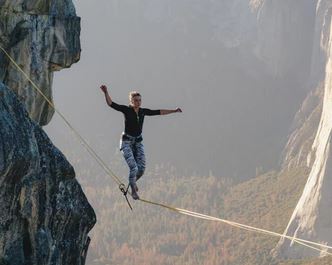Question: Where is the middle ground between “stop caring about what others think” and “stop being so selfish”?
 Foto von Leio McLaren
Foto von Leio McLarenAntwort: Sowohl die Sorge darum, was andere Menschen denken, als auch der Egoismus sind Teil unserer biologischen Veranlagung und auch unserer Erziehung. Manche Menschen werden mit mehr Einfühlungsvermögen und sozialem Bewusstsein geboren, manche mit weniger. Ich glaube, dass wir auch einen angeborenen Sinn für das Gleichgewicht zwischen unseren Bedürfnissen und denen anderer Menschen haben. Ungesunde und manipulative Eltern können jedoch dazu führen, dass Kinder diesen natürlichen Instinkt ignorieren, vergessen und ihm nicht trauen.
Warum kümmert es uns, was andere denken?
Caring for others’ opinions—even when those opinions are quite misguided—was crucial for prospering within a human community for hundreds of thousands of years. People who cooperated with others not only ensured their own survival; it also helped the survival and well-being of their offspring. Sometimes it was a matter of life and death—through most of human history, a person who was ostracized from a community could easily die. Only a few centuries ago, just being slightly strange or stepping on the wrong person’s toe could result in being burned at the stake. That’s a pretty strong motivation for caring about what others think!
On the other hand, selfishness could also result in a person gaining an advantage over others, ensuring their own and their children’s survival and prosperity. That’s why, as a species, we never lost it, despite the pressure to cooperate. Obviously, selfishness worked best for those who were stronger and more aggressive than the rest.
Das Gleichgewicht finden
But let’s focus on a practical answer: your body will usually send you signals if you are out of balance in either direction. However, it can also send you signals of fear and confusion if you were punished or manipulated as a child to deny your own needs in favor of others. Some parents can instill fear in their children by often expressing their own fear of what others think. Therefore, it’s very important to observe yourself in order to learn to distinguish between a healthy warning of lack of balance in your body and unhealthy emotions that are the result of childhood programming.
If you find this difficult early on, this question might be good guidance: Is what I’m doing bringing more trouble to others than it is important to me?
For example, if you are running to catch a plane, it’s not selfish to cause minor discomfort to other people by asking them to let you jump the queue. If you are exhausted or sick, it’s not selfish to take a seat in public transport, even if there are older people around, as long as none of them seem to be in worse condition than you.
Wenn Sie dagegen mitten in der Nacht besonders laute Musik spielen, verursachen Sie bei vielen Menschen erhebliche Beschwerden und möglicherweise sogar gesundheitliche Probleme, während es Ihr Vergnügen nicht wesentlich schmälern würde, wenn Sie die Musik leiser stellen oder Kopfhörer verwenden würden. Wenn Sie den Bürgersteig blockieren, um sich mit einem Freund zu unterhalten, frustrieren Sie viele Menschen, während es Sie nichts kostet, zur Seite zu gehen.
There are also plenty of situations in which all people involved might have strong needs and desires, in which case finding an answer is not so straightforward. But as long as you are honestly looking for balance, you don’t have to worry that you are being selfish.
If you’re often troubled by what others think, remember that it may be the result of excessive social control over many generations. On the other hand, if others tell you that you’re selfish, it might be useful to sometimes put yourself in their shoes and see yourself from their perspective.
Lesen Sie weiter:
7 Steps To Get Out Of Your Comfort Zone
Wie man Kinder lehrt, ihre Intuition zu nutzen

